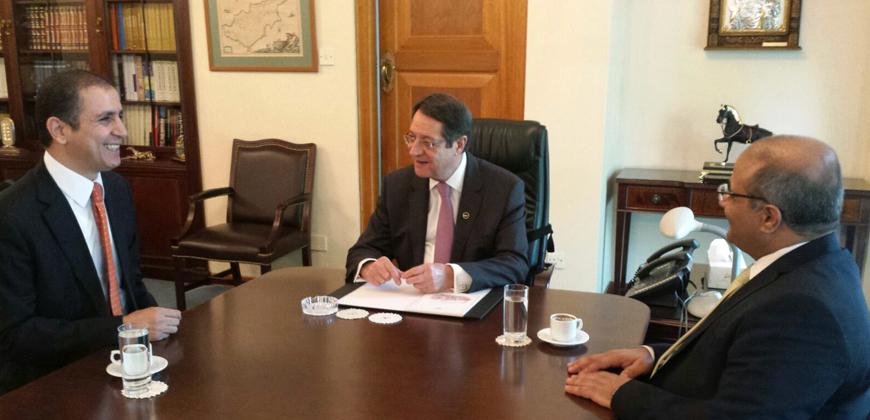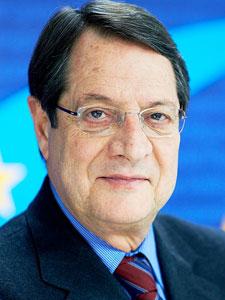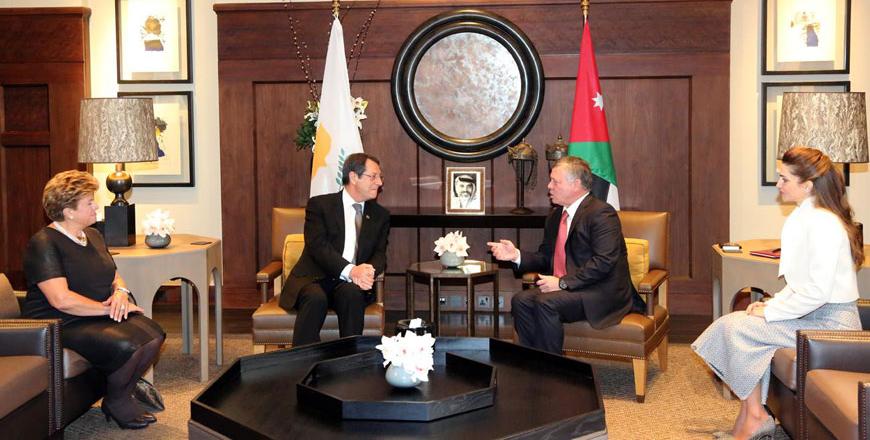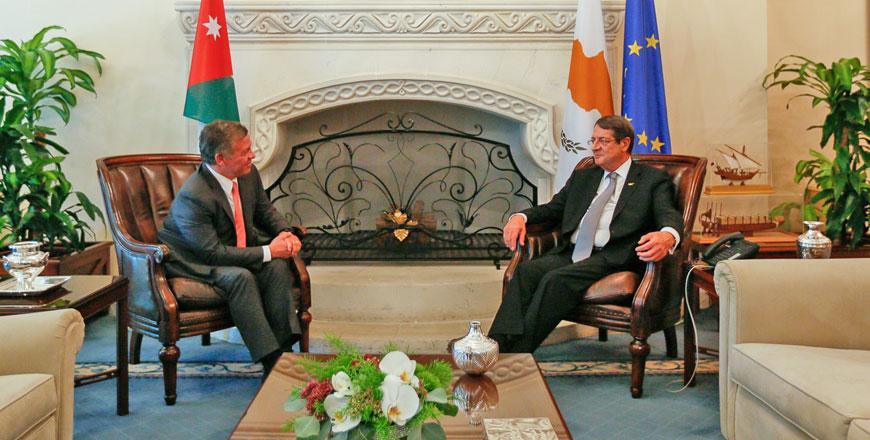You are here
Jordan has a special place in Cyprus’ regional priorities and broader foreign policy — Anastasiades
By JT - Nov 09,2015 - Last updated at Nov 09,2015

Cypriot President Nicos Anastasiades in an interview with The Jordan Times Chief Editor Samir Barhoum and Al Rai Chief Editor Tareq Momani in Nicosia last week (JT photo)
NICOSIA — Cypriot President Nicos Anastasiades said he was keen to enhance his country’s ties with Jordan in various fields.
In an interview with The Jordan Times and Al Rai a few days before his arrival in Amman, the president said that his talks would cover means to boost these ties, regional developments as well as the Cyprus problem, which he said he will continue his efforts to resolve.
In addition, Anastasiades says the international community has failed to understand the complexities of the Middle East and its ongoing problems.
Following is the text of the interview conducted by Al Rai Chief Editor Tareq Momani and The Jordan Times Chief Editor Samir Barhoum:
Q: How do you describe relations between Jordan and Cyprus?
A: Cyprus and Jordan, not only because of their geographical proximity, are bound by traditional and historical bonds of friendship, and our strategic location has left an indelible mark on the culture of both countries which have developed a similar historical heritage.
In recent years Cyprus and Jordan have experienced a considerable rise in their relations. The opening of the embassy of the Republic of Cyprus in Amman in 2009, constituted a milestone in our relations, which in the last years have reached an unprecedented level. In the same way, the opening of the Jordanian embassy in Nicosia in the near future will signal a new chapter in our relations and will facilitate further expansion of the important existing cooperation and interaction between our governments, our institutions and our societies.
In this respect, my visit marks apt proof of our mutual desire to strengthen our bilateral relations and therefore, I am convinced that it will offer us an excellent opportunity to exchange views on practical ways of promoting and further expanding them, in all fields. I want to assure you that Jordan has a special place both in our regional priorities and in our broader foreign policy, and we will continue advancing our mutually beneficial relationship, to the benefit of our peoples.
Q: How do you describe your visit to Jordan and your talks with His Majesty King Abdullah?
A: Taking into consideration the current situation in the wider Middle East and the developments in the Arab world, the cooperation between two moderate countries like ours becomes even more important and imperative. In a broader context, our two countries share the common objective of creating an environment conducive to lasting peace, stability and development in the region and beyond, in which Jordan is a factor of stability and has an essential role to play.
In this respect we are going to exchange views on the situation in the region and are going to highlight the need for cooperation in order to tackle the regional challenges and find political solutions to the problems affecting the eastern Mediterranean and the wider region of the Middle East.
In this context I will express to His Majesty King Abdullah II Ibn Al Hussein our deep appreciation for the efforts of the Hashemite Kingdom of Jordan to deal with the refugee problem, despite the heavy burden on the Jordanian budget and different governmental institutions, as well as on the Jordanian people because of the large number of refugees who found safe refuge in Jordan. The fact that the Hashemite Kingdom of Jordan is providing shelter and adequate living conditions to more than 1.5 million refugees is an act of collective social and humanitarian consciousness that deserves due international merit and applause.
Further, we will also discuss issues related to the relationship between Jordan and the EU, and reiterate our position that Cyprus, as a true and sincere friend of Jordan, will continue to exercise a positive influence when Jordanian interests are discussed to ensure that the refugee influx does not jeopardise the development gains achieved in your country in recent years. To this end, we fully support the establishment of the Mobility Partnership between the Hashemite Kingdom and the EU.
I will also inform about the Cyprus problem and the latest developments and convey my government’s sincere appreciation for Jordan’s principled position on the Cyprus issue, and its support for the termination of Turkish occupation and the reunification of the country on the basis of the UNSC relevant resolutions.
Q: How do you view the so-called Arab Spring developments? And how do you view the solution to regional problems particularly after the rise of the threat of terrorism?
A: Considering Cyprus’ close geographical proximity to the Middle East and North Africa, as well as our historical, political, social and cultural links, I have the strong conviction that the international community has failed to sufficiently appreciate the complexities of the said region.
At the same time, the effects of foreign interventions and interests did not bring about the results that they aspired due to the fact that they both failed to take into account and apprehend the internal characteristics and particular sensitivities of those nations.
And, unfortunately, we have been witnessing ongoing turmoil, extremism, sectarianism, civil war and terrorism taking place in Middle East and North Africa.
The effects of the above are becoming a defining feature of the daily lives of those affected: death, persecution, property dispossession, displacement, destruction of cultural heritage and forced migration.
Therefore, in order to reverse these worrying developments we should direct our efforts so that all those countries and regions in the conflict zones, and in particular the Middle East and North Africa, are turned into places in which sustainable development is a reality.
This can only be achieved through tackling the root causes that have led to this unprecedented situation: political instability and economic insecurity.
We should address this phenomenon collectively and in a comprehensive way:
· It is not enough to take action against those individuals responsible for terrorist attacks. We should direct our efforts towards the enablers of terrorism.
· It is not enough to rescue people from sinking boats. We should direct our efforts against human traffickers.
· It is not enough to financially support the economic immigrants. We should direct our efforts in creating those political and socio-economic conditions so that all those people do not migrate from their countries.
Q: Many consider Cyprus an important part of our region due to its proximity, particularly to Syria, Lebanon, Palestine as well as Jordan. How do you view ties with these countries in the economic, commercial and touristic fields?
A: Cyprus as the nearest EU member state to the Middle East has always taken a special interest in its immediate neighbourhood. For this reason, historically Cyprus has cultivated close and friendly relationships with all its neighbours and this includes also the countries you have mentioned.
In the political field our aim is to bring together like-minded countries and to build ties that would enable a more multilateral approach to the host of problems and challenges that face our countries. It is our understanding that optimum solutions cannot be reached through unilateral means, and regional cooperation will be more productive and fruitful.
With Palestine there is a long history of Cypriot aid to the Palestinian state-building project. During my visit to Ramallah, we will be signing a memorandum of understanding on the management of water resources, which envisions transferring of Cypriot expertise to the Palestinian water authority, so that a master plan for the management of water in the West Bank can be implemented.
In recent years our economic relations with Jordan have increased significantly. There was a 40 per cent increase in trade volume in 2015 compared to 2014, but there is still more to be done. For this reason during my visit to Amman, I will be accompanied by a business delegation with the aim to explore new business and economic potential.
With Lebanon we share strong economic and business ties; several Lebanese banks have branches in Cyprus, while numerous Lebanese business people take advantage of the effective legal and tax framework of Cyprus in order to advance their business plans. In this regard, Cyprus and Lebanon have signed two significant agreements, namely the Agreement on the Reciprocal Promotion and Protection of Investments and the Convention for the Avoidance of Double Taxation and the Prevention of Fiscal Evasion with respect to Taxes on Income and on Capital.
Apart from a business hub for Lebanon and beyond, Cyprus is one of the top tourist destinations for the Lebanese, either for short breaks/weekends or for longer periods. Besides, many refer to Cyprus as the “capital of civil weddings” for the Lebanese, as many couples from the neighbouring country choose Cyprus for their wedding and honeymoon.
Regarding Syria, the tragic civil war is currently preventing any meaningful activity with Cyprus. However, prior to 2011, Cyprus and Syria enjoyed considerable economic relations. I am confident that with the cessation of hostilities, Cypriot and Syrian business will resume their cooperation. Moreover, Cypriot companies will be ready to help in the reconstruction process.
Q: Four decades have passed since the division of Cyprus. Is there any progress in talks between the two sides in Cyprus? Are you optimistic following the current talks on this subject?
A: Since the end of May a new round of negotiations for a comprehensive settlement of the Cyprus problem is under way. While the choice of a new Turkish Cypriot leader has improved the climate in the negotiations, and some progress has been achieved, significant challenges in important aspects of the Cyprus problem still remain.
What we aspire to achieve through this new round of negotiations is to reach a settlement that will reunite our country, its people, the economy and institutions, create a homeland of peaceful coexistence and prosperous collaboration between all of its citizens, and transform Cyprus into a shining example of the ethnic, cultural, religious and linguistic cooperation between Christian and Muslim communities.
A settlement, in full conformity with the values and principles of both the Charter of the United Nations and the EU acquis, the High Level Agreements between the leaders of the two communities of 1977, and 1979, as well as the Joint Declaration of February 11, 2014.
I want to assure that I remain committed to tirelessly work towards finding a settlement and we shall succeed at the very end, I am sure, with the contribution of all stakeholders and all those involved.
In this respect, it is well known that Turkey holds the most critical link to the puzzle of a solution to the Cyprus problem. I am adamant that a solution to the Cyprus problem will benefit not only Cyprus and its people, including our volatile region, but also EU-Turkey and EU-NATO relations. We do hope and expect that Turkey will rise to the challenge.
Q: After the discovery of large gas fields in Cypriot waters, what are your country’s plans to exploit the fields and maximise their revenues in the service of the Cypriot economy and resolving economic problems?
A: Our aim is to maximise the value of natural gas discoveries, to the benefit of the citizens of the republic. My government, in close collaboration with the oil and gas companies holding hydrocarbons licences in Cyprus, always seeks the optimal commercialisation option for natural gas discoveries, through the analysis of the economics of different monetisation choices, the demand in domestic, regional and global markets, and the geopolitical developments of the Eastern Mediterranean. As far as the Aphrodite natural gas discovery in Block 12 of Cyprus EEZ is concerned, the preferred monetisation option is regional pipelines.
Commercial and intergovernmental discussions are under way. We don’t see natural gas revenues as the solution to economic problems. We cannot afford to be shortsighted. We are currently considering the creation of the necessary mechanisms which will allow this and future generations of Cypriot citizens to benefit from natural gas revenues.
Related Articles
NICOSIA — Cypriot President Nicos Anastasiades commended the good ties between his country and Jordan and said his visit to the Kingdom, whi
AMMAN — His Majesty King Abdullah on Wednesday said Jordan wants to explore opportunities to strengthen its economic relations with Cyprus.T
AMMAN — His Majesty King Abdullah on Thursday discussed bilateral relations and regional developments with Cypriot President Nicos Anastasia














